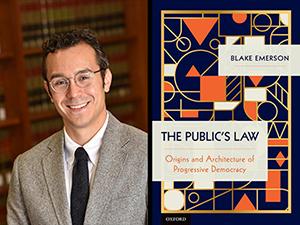The Architecture of Democracy: A Q&A with 'The Public’s Law' Author Blake Emerson

UCLA Law Assistant Professor Blake Emerson is the author of The Public's Law: Origins and Architecture of Progressive Democracy (Oxford University Press, 2018). A theory and history of democracy in the American administrative state, the book describes how American Progressive thinkers including John Dewey, W.E.B. Du Bois, and Woodrow Wilson embraced Hegel's view of the connection between bureaucracy and freedom. Their positive vision of the administrative state influenced New Deal policymaking, as well as the Administrative Procedures Act of 1946 and the War on Poverty. The book develops a theory of the state that emphasizes regulation and provision of social services through deliberative procedures, rather than hinging on economistic thinking or the legitimacy of presidential authority. Emerson recently answered several questions about the book.
The book explores the works of German philosopher G.W.F. Hegel, among others. What made his views so influential on the American political system?
Hegel's thought was particularly important because it offered a compelling critique of the classical liberal ideals of thinkers like Locke and Montesquieu, who had influenced nineteenth century understandings of law and politics. Locke argued that individuals held natural rights to life, liberty, and property, and that government was established by contract to protect those rights. Hegel countered that these rights weren't natural, but rather emerged when individuals in society recognized one another as equals. The Progressives took from this that freedom was something to be achieved through collective social action, not a static value to be protected against government interference. Similarly, whereas Montesquieu treated the legislature, executive, and judiciary as categorically distinct powers that checked one another, Hegel argued that government could only function if the powers were sufficiently integrated to address pressing social problems. These arguments together helped to justify the development of the regulatory state. Other German thinkers like Weber, Schmitt, and Habermas have also exercised powerful influence on American political and legal thought. But I argue that the Progressives' democratic transformation of Hegelian ideas is the most promising thread to recover if we are to rebuild the welfare state in the present.
You cite the New Deal as having qualities that demonstrate bureaucracy at its best. What is a particularly exemplary New Deal program?
My favorite example is probably the Farm Security Administration, which sought to provide financial and technical support for low-income farmers. Most of us know the FSA from the famous photographs it commissioned by artist such as Dorothea Lange and Gordon Parks. But the FSA also engaged in some radical interventions in the rural south to uproot the system of cotton tenancy and promote collective ownership and insurance programs for farmers. In some cases, these interventions helped to lay the groundwork for civil rights mobilization in the 1960s. The FSA understood that democracy wasn't just about voting or arguing but also about ensuring that people have sufficient resources to participate in public life.
What you call "market logic" – running government like a business – has been part of the political lexicon for 30 years or longer. Why is this notion misguided?
Like my UCLA Law colleague Jon Michaels, and Hegel himself, I think that the market and the state are driven by fundamentally different ways of thinking and acting. In the market, people appropriately pursue their self-interest by exchanging property rights through contracts. But in the state, people act together to achieve shared goals through statutory law. The market has expanded well beyond the confines of commercial exchange to dominate people lives and the way the think about questions of justice. When the government relies only on techniques like cost-benefit analysis to decide what kind of conduct to regulate, it can create the impression that efficient markets are the only desirable outcome for public policy. The Progressive vision teaches that we need to put more emphasis on other regulatory goals, such as freedom from domination, economic equality, and collective self-determination.
You write that "the current combination of legislative inaction and increasingly intensive presidential control over administration" undermines democratic progress. Do you see a remedy for the current trajectory? Are we straying from the ideal?
Americans need to orient politics away from the presidency. The president is an important and powerful figure, to be sure. But reliance on the personal authority of a single individual is both dangerous and likely to be ineffective. It is breathtaking, for instance, how quickly President Obama's Progressive vision has been swept away by the Trump Administration. Instead of hinging all hopes on transformational heroes, the public needs to focus energy in two other places: legislation and direct exchanges with administrative agencies. It's been a long time since we've had a fresh burst of major Progressive legislation—probably not since the environmental protection and civil rights statutes of the 70s. We need a new round of statutory authority to address issues like climate change, immigration, and economic inequality. And when Congress designs these programs, it should build in procedures that insure greater opportunity for egalitarian public involvement in the administrative policymaking process. That way, people can feel that they have a hand in shaping the rules that affect them.